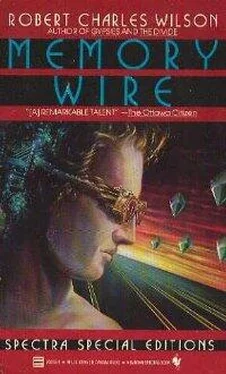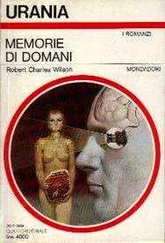Robert Wilson - Memory Wire
Здесь есть возможность читать онлайн «Robert Wilson - Memory Wire» весь текст электронной книги совершенно бесплатно (целиком полную версию без сокращений). В некоторых случаях можно слушать аудио, скачать через торрент в формате fb2 и присутствует краткое содержание. Год выпуска: 1987, ISBN: 1987, Издательство: Bantam Spectra, Жанр: Фантастика и фэнтези, на английском языке. Описание произведения, (предисловие) а так же отзывы посетителей доступны на портале библиотеки ЛибКат.
- Название:Memory Wire
- Автор:
- Издательство:Bantam Spectra
- Жанр:
- Год:1987
- ISBN:978-0-553-26853-9
- Рейтинг книги:4 / 5. Голосов: 1
-
Избранное:Добавить в избранное
- Отзывы:
-
Ваша оценка:
- 80
- 1
- 2
- 3
- 4
- 5
Memory Wire: краткое содержание, описание и аннотация
Предлагаем к чтению аннотацию, описание, краткое содержание или предисловие (зависит от того, что написал сам автор книги «Memory Wire»). Если вы не нашли необходимую информацию о книге — напишите в комментариях, мы постараемся отыскать её.
Memory Wire — читать онлайн бесплатно полную книгу (весь текст) целиком
Ниже представлен текст книги, разбитый по страницам. Система сохранения места последней прочитанной страницы, позволяет с удобством читать онлайн бесплатно книгу «Memory Wire», без необходимости каждый раз заново искать на чём Вы остановились. Поставьте закладку, и сможете в любой момент перейти на страницу, на которой закончили чтение.
Интервал:
Закладка:
“But you may have a problem yet. There was a man at the Virginia facility, an Agency man, a latent sociopath from the war years. His name is Stephen Oberg. He was in charge of the Pau Seco interdiction. Word is that he has an obsessive personal fear of the oneiroliths… and that he went rogue after the stone left Brazil.” Wexler peered at him, wheezing faintly. “He may still be on your case.”
“Oberg,” Byron said. The name was faintly familiar. It called up some sinister echo.
Wexler sat down among the shadows. He pulled his collar up, as if against a chill only he could feel. “Rumor has it,” Wexler said, “the man is quite insane.”
2. Byron navigated his rental barque home through the night canals now, past neon-lit dance shacks and constellations of paper lanterns.
He was mindful of the Angel tattoo on his arm: Wexler had mentioned it. He had spent so much time, he thought, trying to erase it. Not the symbol but the thing, the fact, what he had become in the war.
What he had told Keller back in Belem was true. He did not want to be a machine; he understood that he had become a machine; he understood that the road back into the world was treacherous and painful. Teresa was his road. All he had ever wanted was a life with her. That would be enough. But if not that, then at least the scars of humanity: the pain of a commitment he could not revoke.
The question he entertained now, for the first time, was: when is it enough?
How much pain is proof? How much is too much?
I could disappear, he thought. I could buy documents and disappear into the mainland. Leave the Floats, leave the dream trade, leave no trail for this Oberg to follow. Make some new life and disappear into it, maybe find a woman who might love me, he thought, and make babies with her. The old tattoo had pretty much faded. A sleeve was enough to cover it.
It was an intoxicating thought, but also dangerous. He forced it away as he docked the boat. Too much unfinished business. She needed him yet. There was still the possibility he could do something for her.
The balsa was dark inside. Pushing through the door, he heard a moan from the back bedroom.
He flicked a wall switch; an antique incandescent bulb radiated sterile and sudden light. “Teresa?” But she only moaned again. The sound might have signified pain or pleasure.
He pushed through a rag curtain into the back room.
She was alone on the bed, blinking at the light. Her pupils were massively dilated.
Byron picked up the small wide-necked bottle from the floor beside the bed. It was three-quarters full of tiny black pills. Enkephalins, he thought. Concentrated, potent. “My Christ,” he whispered.
Her moan was abstracted pleasure. She was obviously ashamed—in some corner of her mind—that he had found her this way. She averted her face. But the shame could not override the flush of chemical well-being. There were pinpricks of sweat on her forehead.
Hardly aware of himself, he sat on the bed and cradled her head against him.
She rolled away. “I’m sorry,” she said. Her voice was faint, hollow, oceans distant. “I’m sorry. I’m sorry.”
But there was nothing to say. Nothing worth saying.
He held her, and the boat rose in the swell.
CHAPTER 19
Keller contacted Vasquez, the Network producer, and negotiated an infusion of credit into one of his phantom accounts. Vasquez also supplied some temporary documentation and access to the downloading facilities in the Network technical compound. “But make it quick,” Vasquez urged. “I’m under a certain amount of time pressure. Is it good footage?”
Keller recalled Pau Seco, the mine and the old town, the bars and brothels. He nodded.
“Good,” Vasquez told him. “You have an appointment with Leiberman.”
Leiberman, the Network neurosurgeon, plucked out Keller’s memory chip and closed the socket wound with adhesives. In a month there would be no visible scar. “Once again,” Leiberman said loftily, “you are merely human.” He handed Keller the memory in a tiny transparent pillbox, as prosaic in its bed of cotton as a pulled tooth.
Keller went directly to the Network compound, displayed his new ID to the machine at the gate and claimed an editing booth. The technical compound sprawled over a vast expanse of desert west of Barstow, bunkers and Quonsets and a string of satellite bowls solemnly regarding the southern sky. There was a floating staff of Network engineers, but most of the people here were independent contractors—by his ID Keller was one of these—sharing time on the Network mainframes.
The booth was private, a small room crowded with monitors and mixers. Keller plugged his memory into a machine socket, named it and gave it an access code. He pulled the keyboard into his lap and put his feet up on the mixer.
Time, he tapped.
Forty-one days, the monitor said, twenty-eight minutes, fifteen seconds since the memory was activated. He registered a faint surprise: it had seemed like more.
He instructed the edit program to install index marks at every twenty-four hour point—day marks—and then divide them into hours. “Laying ordinance,” it was called. He installed special index points at Day Seven ( Arrival, Rio), Day Fifteen ( Arrival, Pau Seco), and Day Twenty-five ( Arrival, Belem). Further index points could be installed as necessary; these were the basics, a kind of crude map. Now he could call up a day or an hour and retrieve it at once, enter it into the mainframe memory as part of the ROM package he would eventually hand Vasquez.
Protection first, however. He called up the Identity Protectsubroutine, then scanned through Day Twountil he arrived at a full-body image of Byron Ostler.
The central thirty-inch monitor showed Byron in front of his huge, ramshackle balsa deep in the Floats. Keller stilled the image, zoomed on the face, keyed Alter. The face was replaced abruptly with its own ghost image in topographic lines against limbo, glowing amber.
Keller used a light pencil to push the lines around.
Cheekbones up, a narrower chin. He rotated the image and similarly altered the profile. He called up flesh again and there was Byron standing by his float once more, but it was not Byron any longer; the face was not even faintly familiar. It was some older, heavyset, hawkish man. A generic face, neither good nor evil, Retain, Keller typed. The authentic image would never appear in the finished edits. Next he called up Teresa.
This was more painful. The sight of her stirred old feelings in him, a longing he labored to suppress. She moved across the monitor, regarding him.
I can’t see making this trip with somebody I don’t trust… intuition is all I have right now, you understand?
Her voice filled the booth. A sixteen-bit recreation of the trace he had laid down on this chip. She peered out from the monitor into, it seemed, his eyes. Convulsively, he called up Alter.
She became a matrix of lines, an artifact of geography.
Better that way.
Sweating now, he changed the lines with his light pencil. Moving with professional instinct, he flattened the mouth, rounded the nose, shortened the hair. He worked by rote, eyes narrowed. Wu-nien. It was a question of not caring.
He performed similar alterations on Ng and Meireilles, who might still be vulnerable—he was conscientious about protecting his sources—then paged ahead to the most significant footage, the footage Vasquez wanted, the Pau Seco footage.
Day Sixteen. The frame shook as he stepped out of Ng’s Truck, Hold Frame Pan, he typed, and played it back. Now the motion was smooth, effortless. The image flickered as he blinked away dust. Keller keyed out Hold Correct; the dropouts vanished. Beginning to look like video now. The perspective moved up to the lip of the mine, peered into its depths, began a slow pan. Audio, he typed.
Читать дальшеИнтервал:
Закладка:
Похожие книги на «Memory Wire»
Представляем Вашему вниманию похожие книги на «Memory Wire» списком для выбора. Мы отобрали схожую по названию и смыслу литературу в надежде предоставить читателям больше вариантов отыскать новые, интересные, ещё непрочитанные произведения.
Обсуждение, отзывы о книге «Memory Wire» и просто собственные мнения читателей. Оставьте ваши комментарии, напишите, что Вы думаете о произведении, его смысле или главных героях. Укажите что конкретно понравилось, а что нет, и почему Вы так считаете.












